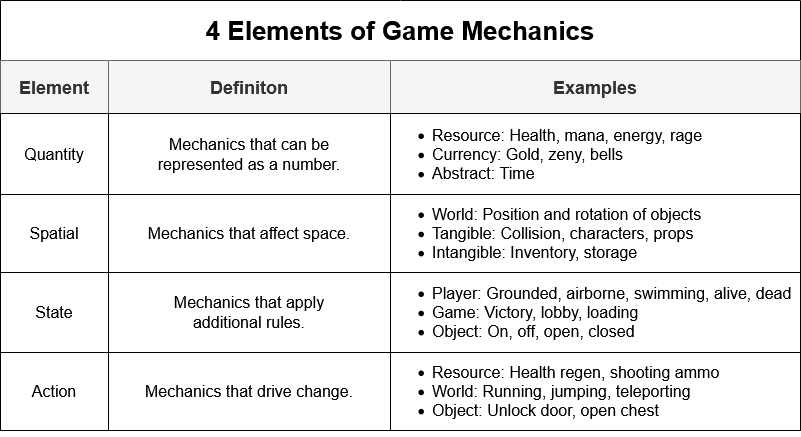In the world of video games, a game mechanic refers to the set of rules or interactions that govern how a game functions. It encompasses the various actions, behaviors, and systems that shape gameplay and player experience. Game mechanics determine how players can interact with the game world, progress through levels, solve puzzles, compete against others, and achieve goals.

To give you some examples of game mechanics:
- Health Points (HP): Many games use health points to represent a character’s vitality. Players must manage their HP strategically to avoid losing all their health and being defeated. Examples include RPGs like Final Fantasy or action games like The Legend of Zelda.
- Power-Ups: Power-ups are temporary enhancements that provide players with special abilities or advantages. They can boost speed, strength, defense, or provide other unique abilities. Mario Kart’s item boxes containing shells or bananas are classic examples.
- Experience Points (XP) and Leveling Up: RPGs often utilize XP to measure a character’s growth and progression. Players earn XP by defeating enemies or completing quests, which allows them to level up and gain new abilities or attributes.
- Puzzles: Puzzle mechanics challenge players’ problem-solving skills by presenting them with obstacles that require logical thinking or pattern recognition to overcome. Portal is an excellent example of a puzzle-based game where players manipulate portals to navigate through mazes.
- Stealth: Stealth mechanics focus on avoiding detection by enemies through careful movement, hiding in shadows, utilizing disguises, or distracting opponents. The Metal Gear Solid series demonstrates this mechanic well.
- Choice-Based Narratives: Games like Life is Strange or The Walking Dead present players with choices that have significant consequences for the storyline and character development. These choices shape the narrative based on player decisions.
These are just a few examples among countless game mechanics used in different genres of video games. Game developers often combine various mechanics to create unique and engaging gameplay experiences.
Here are more mechancis used in games
Here are some common types of game mechanics:
- Movement Mechanics: These govern how players navigate and control their characters within the game world. Examples include walking, running, jumping, flying, or swimming.
- Combat Mechanics: These mechanics determine how players engage in combat or conflict within the game. They can include actions like attacking, blocking, dodging, or using various weapons or abilities.
- Puzzle Mechanics: Puzzle mechanics challenge players to solve puzzles or overcome obstacles to progress in the game. This can involve riddles, logic puzzles, physics-based puzzles, or pattern recognition challenges.
- Resource Management Mechanics: These mechanics require players to manage limited resources such as health, ammunition, currency, or time. Players must make strategic decisions on how to allocate and replenish these resources.
- Progression Mechanics: Progression mechanics track a player’s advancement through the game and reward them with new abilities, items, levels, or story elements as they make progress.
- Social Interaction Mechanics: These mechanics facilitate player interaction with other players or non-player characters (NPCs). They can include features like chat systems, multiplayer modes, cooperative gameplay options, or dialogue choices affecting relationships.
- Exploration Mechanics: Exploration mechanics encourage players to explore the game world by rewarding them with hidden treasures, secret areas, lore fragments, or narrative revelations when they venture off the beaten path.
- Stealth Mechanics: Stealth mechanics enable players to avoid detection by enemies by using stealthy movements and actions like hiding in shadows or distracting enemies.
These are just a few examples of the many types of game mechanics that exist in different genres of games. Game designers often combine multiple mechanics creatively to deliver unique gameplay experiences!
« Back to Glossary Index




